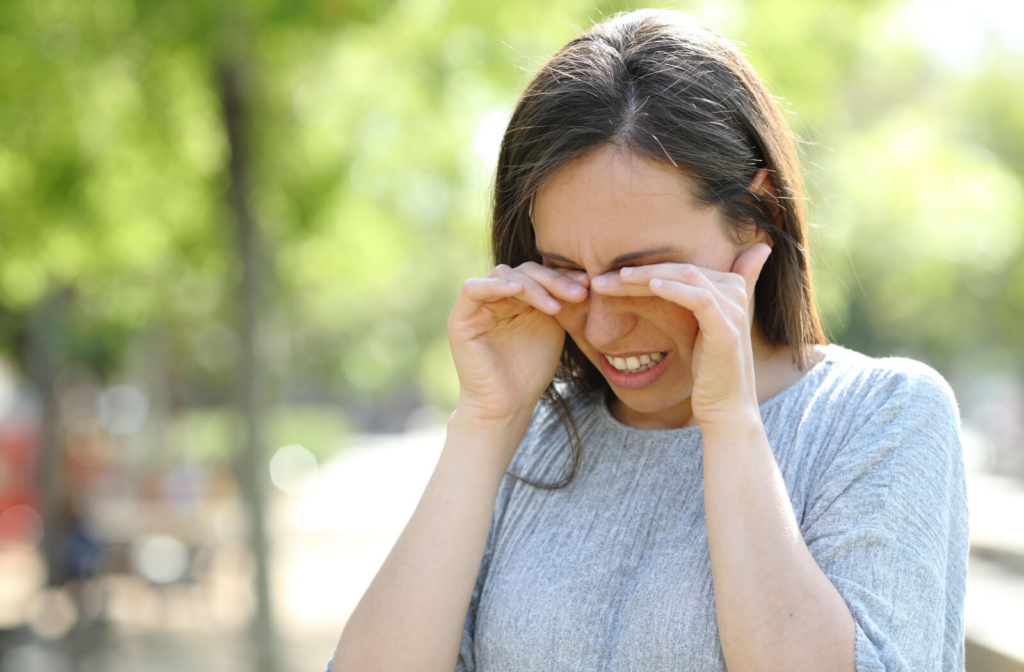When thinking about allergies, you may first think of sneezing or trouble breathing. However, allergies come with many triggers and symptoms.
Allergies that affect your vision are usually called allergic conjunctivitis and can result in itchiness, dry eyes, and blurry vision.
It can be challenging to tell what’s causing your symptoms, especially if you’re experiencing them for the first time. Your optometrist can help, but understanding eye allergies signs can save you a lot of time scratching and wondering.
What Causes Eye Allergies?
There are different allergy symptoms depending on what triggers you, but the underlying cause is basically the same. To summarize, an allergy is your body overreacting to a normally harmless substance called an allergen.
This allergen can be any number of things. Though for allergic conjunctivitis, you’re typically looking for something that can get into your eye and trigger a response. Common allergens for eye allergies include:
- Pollen from grass, trees, and weeds
- Dust mites
- Pet dander
- Mold
- Perfume
- Cigarette smoke
- Diesel exhaust
Many of these triggers can be found all year round, but as anyone who has spent time outdoors during spring and early summer can attest, pollen counts can get pretty high. Once high winds start blowing, you’ll know it’s allergy season again.
Eye Allergy Symptoms
Eye allergies can indirectly and directly affect your vision and sometimes share symptoms with other eye conditions. That’s why it’s crucial to get your eyes examined by a professional if you think something is wrong.
Symptoms of eye allergies include:
- Watery eyes
- Itchiness or burning
- Blurry vision
- Dry eyes
- Red eyes
- Dark under-eye circles (allergic shiners)
- Swollen eyelids
- Light sensitivity
- Watery or thick mucus discharge
Eye Allergies & Blurry Vision
One of the main ways allergies can affect your vision is by making it hard to see.
When an allergen enters your eye, your body reacts by releasing histamines. Histamines have many important bodily functions, such as regulating your sleep-wake cycle and cognitive function. Still, when released during an allergic reaction, they can cause irritating or even dangerous symptoms.
Histamines can cause inflammation and swelling of the blood vessels in your eyes and eyelids. When this swelling puts pressure on your eye, you may have blurry vision. Giant papillary conjunctivitis, a type of eye allergy generally caused by wearing contact lenses, is known for causing blurriness and can make your contact lenses less effective at correcting vision.
Your eyes might also produce more tears to wash the allergens out of your eyes. While this reaction might offer some relief, it can make it hard to see as you peer through a layer of water.
And if it’s not tears blocking your sight, it could be mucus. People with skin conditions around the eye who have eye allergies could notice significant amounts of thick mucus that may cause their eyelids to stick together.
Eye Allergies and Dry Eyes
Inflammation caused by the release of histamines during an allergic reaction may block the glands that create healthy tears. At the same time, you may appear to be producing a lot of tears. This might sound contradictory, but since tears are made up of proteins that keep them stable, a dysfunction could result in your tears evaporating too quickly to hydrate your eyes.
Another cause of dry eyes from allergies is a bit less direct. A standard treatment for allergies is antihistamines. Unfortunately, the same antihistamines that help with rashes and sneezing could also reduce tear production.
For many people, this reduction isn’t noticeable. But if you have untreated dry eye disease, allergy relief may come with more irritation than you expected. In addition, scratching or rubbing dry eyes could worsen the symptoms or damage the front of your eye.
If you experience dry eyes and eye allergies, you may need to use artificial tears to keep your eyes hydrated or ask your doctor to recommend an alternative medicine.

Relief for Eye Allergies
A doctor may recommend eye drops to alleviate symptoms or wash out allergens, but if allergies are causing your vision problems, one of the best things you can do is prevent them from triggering in the first place.
Here are some tips for reducing your exposure to airborne allergens:
- Wash your hands after touching a pet
- Clean your clothes after visiting a house that has pets
- Close your windows to prevent pollen from getting inside
- Use “mite-proof” pillow covers and bedding to reduce exposure to dust mites
- Control mold by lowering the humidity in your house and cleaning your kitchen, bathroom, and basement regularly
- Wear wraparound sunglasses when outdoors
If allergies are to blame for your blurry vision or dry eyes, they should fade once the allergic reaction is done. However, if they don’t, it could be due to a more severe eye health issue if they don’t.
If your symptoms are severe, they persist beyond the allergic reaction, or your eyes are swelling, you should see a doctor immediately.
Proactive Vision Care
It can be scary when something’s affecting your vision, and you don’t know what it is. Griffin Optometric Group can assess your eye health to uncover the cause and recommend a solution for you.
If you’re looking for relief from vision problems caused by allergies, book an appointment with us today!



